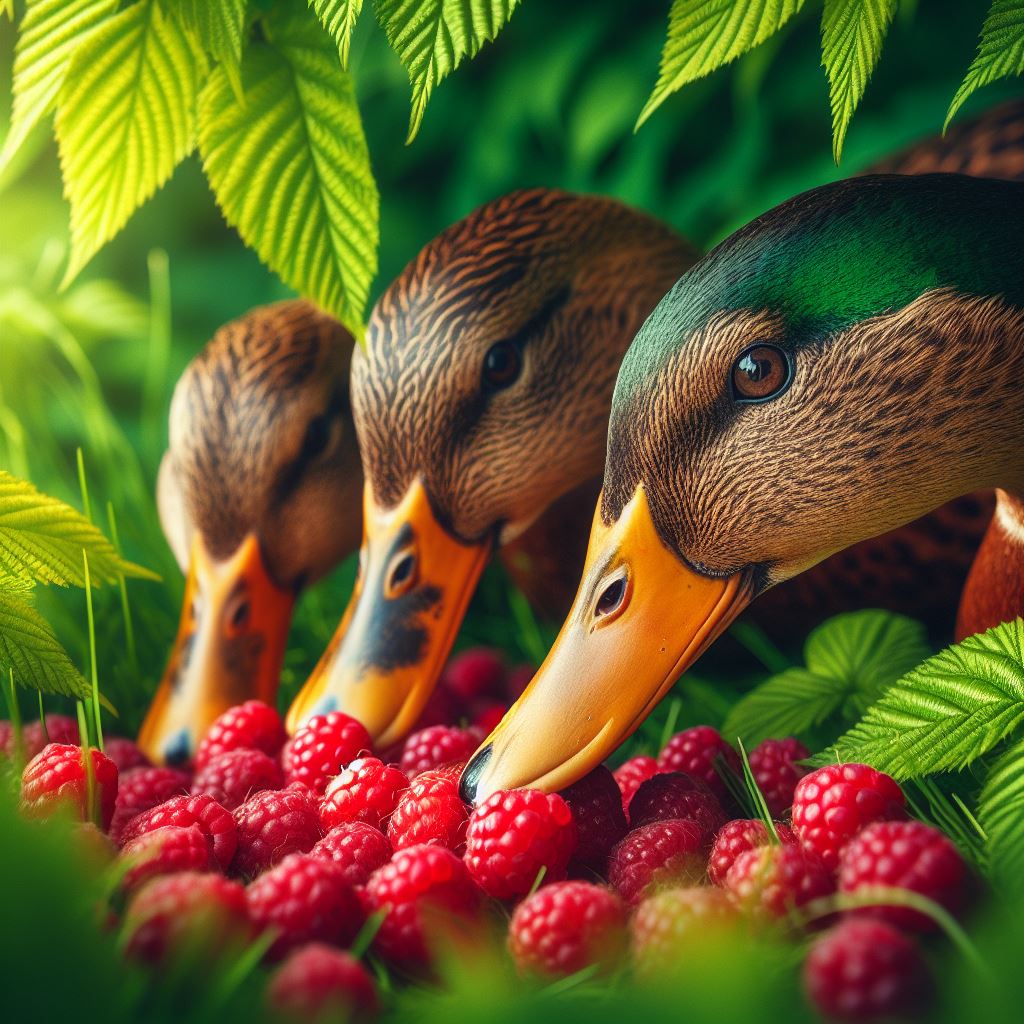Yes, ducks can safely eat raspberries.
I recommend feeding ducks raspberries in moderation as an occasional treat.
Raspberries contain beneficial vitamins, minerals, and antioxidants.
However, they are high in sugar and should not make up a significant portion of a duck’s diet.I advise washing raspberries thoroughly before feeding them to ducks to remove any pesticides or contaminants.
Cut the berries into small, bite-sized pieces to prevent choking hazards.
One or two raspberry pieces per treat is sufficient.While raspberries themselves are safe for ducks to consume, overfeeding can lead to health issues like obesity and diarrhea.
It’s best to limit raspberry treats to no more than once a week.
Raspberries should comprise only about 10% of a duck’s total food intake.For more detailed information on safely incorporating raspberries into your ducks’ diets, check out my full article below.
I cover proper serving sizes, preparation methods, nutritional benefits, and potential risks of overfeeding.
Getting the raspberry-to-feed ratio right is key for your ducks’ health.

- What nutrients do raspberries provide that are beneficial for ducks? This asks about the specific nutritional value of raspberries for ducks.
- How many raspberries can I safely feed my duck per day?
- Can ducklings eat raspberries or should I wait until they are adults?
- Do wild ducks eat raspberries when foraging naturally?
- Should I mash up raspberries before feeding them to my duck?
- Can too many raspberries upset a duck's digestive system? This asks about potential downsides of overfeeding ducks with raspberries.
What nutrients do raspberries provide that are beneficial for ducks?This asks about the specific nutritional value of raspberries for ducks.
Raspberries provide several beneficial nutrients for ducks, including vitamins, minerals, and antioxidants.
These elements are essential for maintaining good health, supporting the immune system, and promoting proper digestion.
Raspberries are a good source of dietary fiber, which aids in digestion and helps keep the ducks’ digestive systems healthy.
They are also rich in vitamin C, an important nutrient for the growth and development of ducks, and antioxidants that help protect the ducks’ cells from damage.
Additionally, raspberry leaves are a good source of nutrients for ducks, including vitamin C and calcium.
However, it’s important to feed raspberries to ducks in moderation, as they should only make up a small part of their diet.
A balanced and varied diet is crucial for meeting all of the ducks’ nutritional needs, so raspberries should be supplemented with other healthy foods.
| Nutrient | Benefits for Ducks |
|---|---|
| Vitamin C | Essential for growth and development, supports the immune system |
| Antioxidants | Protects cells from damage, boosts overall health |
| Dietary Fiber | Aids in digestion, helps maintain healthy digestive system |
| Calcium | Important for egg-laying ducks, produces healthy eggs |
| Vitamin K | Supports various bodily functions |
| Magnesium | Essential for supporting muscles and nerves |
Feeding raspberries to ducks should be done in moderation, and it’s important to monitor their intake and ensure that raspberries are just a part of their overall diet.
It’s also recommended to choose organic raspberries to minimize exposure to pesticides and to ensure that the fruits are fresh and free from mold or spoilage.
How many raspberries can I safely feed my duck per day?
I can advise on a safe quantity of raspberries to feed your duck daily.
When fed in moderation, raspberries can make a healthy, natural treat for ducks.
However, they do contain high amounts of natural sugar, so should be limited in the diet.I would recommend only feeding your duck 1-2 raspberries per day at maximum.
This small serving size allows them to enjoy the sweet berry as a snack, without risking health issues from too much sugar or other nutrient imbalances in their main diet.
I suggest cutting the berries in half or quarters and mixing them into their feed to prevent choking.
Monitor your duck after eating raspberries for any signs of diarrhea, as overripe berries may cause digestive upset.
Can ducklings eat raspberries or should I wait until they are adults?
I would not recommend feeding raspberries to baby ducklings.
Their digestive systems are still developing and cannot properly process foods high in natural sugars like fruit.I suggest waiting until your ducks are fully grown, at least 10-12 weeks old, before offering treats like raspberries.
Once adult, most domestic duck breeds can enjoy raspberries and other fruits in moderation as the occasional snack.
But even then I’d advise limiting their fruit intake to no more than 10% of their total diet.For now, focus on providing your ducklings with a complete, balanced starter feed specifically formulated for juvenile waterfowl.
And be sure they always have access to fresh, clean water.
With the proper care and nutrition at this early stage, you’ll set your ducks up for healthy growth and development.
Do wild ducks eat raspberries when foraging naturally?
I can provide some insight into the natural foraging habits of ducks.
In short, wild ducks do not typically eat raspberries as part of their natural diet.Wild ducks are omnivorous birds that feed on a variety of plant and animal matter.
Their preferred natural foods include aquatic plants and invertebrates, seeds, and some small fish and amphibians.
When foraging on land, ducks graze mainly on grasses, aquatic plants, seeds, grains, some fruits, and aquatic insects.Raspberries, which grow on brambly bushes, are not a common natural food source encountered by wild ducks in their wetland and grassland habitats.
Ducks lack the ability to efficiently harvest and digest berries from dense thickets.
Their bills and digestive systems are better adapted for straining nutritious invertebrates from mud and water.
While not impossible, it would be uncommon to observe a wild duck intentionally seeking out and consuming fallen raspberries.

Should I mash up raspberries before feeding them to my duck?
I recommend lightly mashing raspberries before feeding them to your ducks.
Here’s why:Raspberries have small, delicate seeds and skin that can be difficult for ducks to digest whole.
Lightly mashing allows the ducks to easily consume the soft flesh of the berry, while breaking down some of the seeds and skin.
This makes it gentler on their digestive system.I suggest placing the raspberries in a bowl and lightly pressing on them with a fork.
You don’t need to completely puree them into a sauce, just gently break them down a bit.
Some texture and seeds are fine, you just want to rupture a portion of the berries.Feed your ducks the mashed raspberries right away before they become too juicy.
Offer them in moderation along with their normal balanced diet.
About 1⁄4 to 1⁄2 cup of mashed raspberries per adult duck is a good amount.Going forward, always aim to lightly mash or process any small soft fruits with lots of tiny seeds prior to feeding your domestic ducks.
Can too many raspberries upset a duck’s digestive system?This asks about potential downsides of overfeeding ducks with raspberries.
I understand the importance of ensuring the well-being of our feathered friends.
While raspberries can be a nutritious and enjoyable treat for ducks, it’s essential to be mindful of the quantity provided.
An excessive amount of raspberries can upset a duck’s digestive system, leading to discomfort and potential health issues.
Therefore, it’s best to offer raspberries to ducks in moderation to avoid any adverse effects on their digestion.Ducks can enjoy raspberries as part of their diet, but it’s important to remember that moderation is key.
Too many raspberries can upset a duck’s digestive system, leading to discomfort and potential health issues.
It’s best to provide a balanced diet for ducks, which includes a variety of foods in appropriate portions.
This approach will help ensure that they can enjoy raspberries as a treat without experiencing any negative effects on their digestion.
